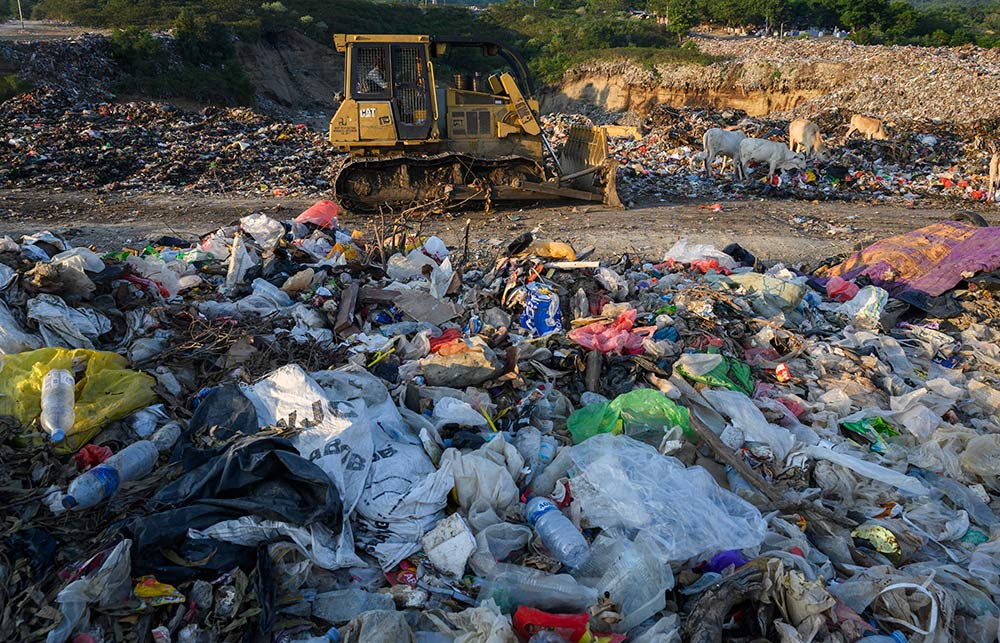
這項技術能幫助解決塑料垃圾日益增多的問題,因為它可以把塑料恢復到原始結構。不僅如此,它還能提供當前無法實現的新方法,改進塑料回收過程,減少使用化石燃料生產新塑料的需求。但到目前為止,這種技術的降解過程過于緩慢,還無法用于商業用途。
早在2016年,科學家在日本的一家垃圾回收廠內發現了吃塑料的細菌。兩年后,英國樸茨茅斯大學(University of Portsmouth)和美國能源部(U.S. Department of Energy)國家可再生能源實驗室(National Renewable Energy Laboratory)的研究人員嘗試模擬這種細菌中的“PETase”酶,以深入了解它的特性,結果研究人員意外合成了一種突變酶,這種酶降解聚對苯二甲酸乙二酯(PET)塑料的效率更高。PET塑料常被用于生產塑料瓶。
兩年后,研究人員有了新的發現。
他們在近期發表的一篇研究報告中表示,突變PETase酶可以與從同一種吃塑料的細菌中發現的另外一種MHETase酶合成。他們發現,這兩種酶合成后,降解塑料的速度提高了一倍。如果精心設計兩種酶之間的連接方式,降解速度還能提高三倍。
換言之,這種“多種酶混合液”降解塑料的速度是最初發現的突變PETase酶(比正常PETase酶快20%)的6倍。
樸茨茅斯大學教授約翰?莫吉翰在聲明中表示:“我們的首批試驗顯示,兩種酶結合的效果更好,所以我們決定將兩者連接起來,就像是用一根繩子把兩個吃豆人連在一起。英美兩國的研究人員為此做了大量工作,但這些努力都是值得的。我們很高興看到,這種新型嵌合酶降級塑料的速度是自然進化的單獨一種酶的三倍,這為我們進一步提升降解速度開辟了新的途徑。”
莫吉翰教授告訴《衛報》稱,如果學術界能夠與法國的Carbios等生物回收公司合作,這項技術將有望在“未來一兩年內”實現商業應用。Carbios最近也發現了一種能夠快速降解塑料瓶的酶,但這種酶需要在高溫環境下才能降解,而新發現的超級酶并沒有溫度要求。
莫吉翰教授還表示,可以將吃塑料的酶與能夠降解天然纖維的酶合并,從而實現聚酯纖維和棉線等混紡織物的回收。目前這種織物仍無法循環利用。(財富中文網)
翻譯:劉進龍
審校:汪皓
英美兩國的研究人員表示,未來幾年,或許會有“多種酶混合液”在垃圾回收站開心地啃食塑料。
這項技術能幫助解決塑料垃圾日益增多的問題,因為它可以把塑料恢復到原始結構。不僅如此,它還能提供當前無法實現的新方法,改進塑料回收過程,減少使用化石燃料生產新塑料的需求。但到目前為止,這種技術的降解過程過于緩慢,還無法用于商業用途。
早在2016年,科學家在日本的一家垃圾回收廠內發現了吃塑料的細菌。兩年后,英國樸茨茅斯大學(University of Portsmouth)和美國能源部(U.S. Department of Energy)國家可再生能源實驗室(National Renewable Energy Laboratory)的研究人員嘗試模擬這種細菌中的“PETase”酶,以深入了解它的特性,結果研究人員意外合成了一種突變酶,這種酶降解聚對苯二甲酸乙二酯(PET)塑料的效率更高。PET塑料常被用于生產塑料瓶。
兩年后,研究人員有了新的發現。
他們在近期發表的一篇研究報告中表示,突變PETase酶可以與從同一種吃塑料的細菌中發現的另外一種MHETase酶合成。他們發現,這兩種酶合成后,降解塑料的速度提高了一倍。如果精心設計兩種酶之間的連接方式,降解速度還能提高三倍。
換言之,這種“多種酶混合液”降解塑料的速度是最初發現的突變PETase酶(比正常PETase酶快20%)的6倍。
樸茨茅斯大學教授約翰?莫吉翰在聲明中表示:“我們的首批試驗顯示,兩種酶結合的效果更好,所以我們決定將兩者連接起來,就像是用一根繩子把兩個吃豆人連在一起。英美兩國的研究人員為此做了大量工作,但這些努力都是值得的。我們很高興看到,這種新型嵌合酶降級塑料的速度是自然進化的單獨一種酶的三倍,這為我們進一步提升降解速度開辟了新的途徑。”
莫吉翰教授告訴《衛報》稱,如果學術界能夠與法國的Carbios等生物回收公司合作,這項技術將有望在“未來一兩年內”實現商業應用。Carbios最近也發現了一種能夠快速降解塑料瓶的酶,但這種酶需要在高溫環境下才能降解,而新發現的超級酶并沒有溫度要求。
莫吉翰教授還表示,可以將吃塑料的酶與能夠降解天然纖維的酶合并,從而實現聚酯纖維和棉線等混紡織物的回收。目前這種織物仍無法循環利用。(財富中文網)
翻譯:劉進龍
審校:汪皓
A new "enzyme cocktail" could be happily munching plastic at recycling sites within a couple of years, according to British and American researchers.
The technique wouldn't just help to deal with the problem of ever-increasing plastic waste—because it returns the plastic to its original building blocks, it could also improve the recycling process in ways that are currently impossible, reducing the need to make new plastic out of fossil fuels. But until now, the process seemed too slow for commercial viability.
Back in 2016, scientists discovered plastic-eating bacteria at a recycling plant in Japan. Two years later, researchers from the University of Portsmouth in England and the U.S. Department of Energy's National Renewable Energy Laboratory were trying to model the "PETase" enzyme contained in the bacteria to understand it better—and they accidentally engineered a mutant version that was even more efficient at breaking down the polyethylene terephthalate (PET) plastic that is commonly used to make bottles.
Fast-forward another two years, and the researchers have made yet another discovery.
As detailed in a research paper published Monday, the mutant PETase can be combined with another enzyme called MHETase, found in the same trash-dwelling bacterium. It turns out that the simple mixing of the two enzymes doubles the speed of their plastic digestion. And if a connection is engineered between the two enzymes, the digestion is another three times faster.
In other words, this enzyme cocktail can digest plastic up to six times faster than the original mutant PETase (which was itself 20% faster than the natural PETase) can.
"Our first experiments showed that they did indeed work better together, so we decided to try to physically link them, like two Pac-men joined by a piece of string," said University of Portsmouth professor John McGeehan in a statement. "It took a great deal of work on both sides of the Atlantic, but it was worth the effort. We were delighted to see that our new chimeric enzyme is up to three times faster than the naturally evolved separate enzymes, opening new avenues for further improvements."
McGeehan told the Guardian that commercial use could start happening "within the next year or two" if the academics work in partnership with biorecycling firms such as France's Carbios, which recently found an enzyme that quickly digests plastic bottles, but at high temperatures that the new super-enzyme does not require.
The professor also told the newspaper that it might be possible to combine plastic-eating enzymes with those that break down natural fibers, which would allow for the currently impractical recycling of mixed fabrics that include both polyester and cotton.






